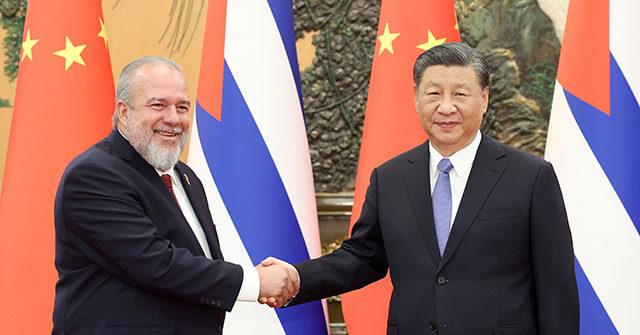The House Homeland Security Subcommittee on Transportation and Maritime Security held a hearing on Tuesday to investigate reports that China is constructing four powerful signals intelligence (SIGINT) facilities in Cuba to spy on Americans.
China’s plans to build new spy stations in Cuba were first reported by the Wall Street Journal (WSJ) in 2023. The report, denied by the Biden White House but quickly confirmed by other media organizations, said Beijing offered Havana “several billion” dollars to build the first of its “listening outposts” within 100 miles of the Florida coast. The installation would give China the ability to monitor emails, phone calls, and satellite transmissions across the southeastern U.S., potentially including military communications.
WATCH — “Here I Am!” — Trump Warns China over Taking Advantage of American Workers While He Was Gone:
Subsequent reports citing anonymous American intelligence officials indicated that China is expanding its espionage operations in Cuba and had been present and operating there for at least 30 years.
In addition to its surveillance capabilities, the Chinese listening post had symbolic value as a direct challenge to America’s sphere of influence. The Chinese had long complained about U.S. intelligence-gathering operations near its borders and relished the opportunity to turn the tables by building spy stations so close to the U.S. mainland.
A few days after the reports broke, the Biden White House dispatched its National Security Council (NSC) spokesman, John Kirby, to admit the administration knew about the Chinese spy bases all along, but felt it was “absolutely not beneficial” for the American public to know about the threat while intelligence was still being developed. Kirby went on to insist his comments should not be interpreted as a “walk-back” of the Biden administration’s previous position, insisted the WSJ report was “inaccurate” without explaining how, and railed against the media for “shamefully” injecting incomplete information into the “public bloodstream.”
Despite the Biden administration’s claim to know nothing about China’s plans, the spy station story never went away. On Tuesday, the Center for Strategic and International Studies (CSIS) published a report that found “new construction underway” at the SIGINT site near Havana, plus activity at three more sites.
WATCH — President Trump: Joe Biden Let China “Fleece Us” on Trade:
One of these locations was an old Cuban facility near the town of Bejucal that appeared to have received substantial upgrades, including a new circularly disposed antenna array (CDAA), an advanced technology that can monitor radio signals over very long distances. China has a penchant for building CDAA facilities on the militarized reefs it occupies in the South China Sea.
“Since the end of the Cold War, Bejucal has been widely rumored to be part of China’s intelligence-gathering ambitions on the island. U.S. congressional testimony and unclassified government documents have suggested the site has ties to China, and reporting in English and Spanish-language outlets has also linked it to China,” CSIS reported.
“Since the end of the Cold War, Bejucal has been widely rumored to be part of China’s intelligence-gathering ambitions on the island. U.S. congressional testimony and unclassified government documents have suggested the site has ties to China, and reporting in English and Spanish-language outlets has also linked it to China,” the report noted.
Rep. Carlos Gimenez (R-FL), chair of the House Homeland Security Subcommittee on Transportation and Maritime Security, said at Tuesday’s hearing that China’s alleged listening-post collaboration with Cuba “represents one of the most brazen intelligence operations ever attempted near the American mainland, and places our military operations, commercial activity, and communications squarely in the crosshairs of a hostile foreign power.”
“The southeastern United States is home to some of the most critical assets in our nation’s security infrastructure. From the space launch center at Cape Canaveral, to the headquarters of U.S. Southern Command in Miami, this region plays a critical role in our defense posture,” he pointed out.
“The Cuban regime remains a state sponsor of terrorism, harbors fugitives from the U.S. justice system, and relentlessly suppresses the rights of its own people. Its growing reliance on foreign authoritarian powers like China only adds to the danger,” he said.
Ryan Berg, director of the Americas program at CSIS, told the subcommittee that Cuba had plenty of Soviet-made SIGINT equipment left over after the Cold War, giving China a ready-made surveillance infrastructure that could be upgraded to modern standards.
The Chinese quickly stepped into the chaos created by the fall of the Soviet Union with wads of cash in their hands, eager to purchase some of Cuba’s “strategic geography.” Berg said the Cuban Communist regime was also eager to benefit from China’s electronic warfare expertise — jamming Radio Marti transmissions from the United States with Chinese assistance, for example.
“It is telling that of the facilities identified and surveyed in CSIS’ analysis, just one, the new Circular Disposed Antenna Array in El Salao, was not a preexisting signals intelligence (SIGINT) site left over from the Cold War,” he noted.
“For Cuba, China’s financial support represents an important lifeline. For China, the proximity to the United States and potential to access critical military and commercial intelligence strongly incentivizes the PRC to engage in this strategic arrangement with Cuba,” he said.
Berg pointed out that China appears to have abandoned its renovation efforts at one of the Cuban sites after CSIS called attention to it, so “we may reasonably believe that transparency efforts and public criticism have the potential to derail China’s ambitions.” He recommended declassifying more satellite photographs and other intelligence to “apply select pressure to these operations.”
The House Homeland Security Committee and House Select Committee on the Chinese Communist Party sent a letter to Secretary of Homeland Security Kristi Noem on Tuesday to request a formal threat assessment on Chinese SIGINT activities in Cuba.
“If left unchecked, the PRC’s activities in Cuba could establish a forward operating base for electronic warfare, enable intelligence collection, and influence operations that directly undermine U.S. national security interests,” the letter warned.
Read the full article here


